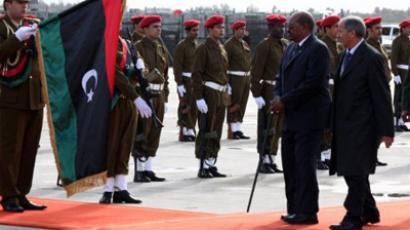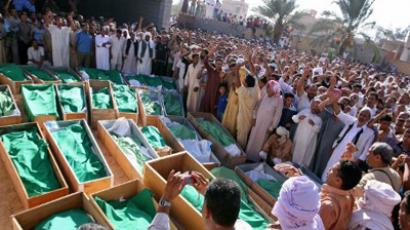Exporting democracy can be dangerous – Pulitzer Prize nominee
Three-time Pulitzer Prize nominee Martin Sieff says America’s foreign policy is misguided in its attempts to export “instant democracy” – and assumptions that the US model will work the same everywhere could have potentially dangerous consequences.
Martin Sieff is a former senior foreign correspondent for The Washington Times and former Managing Editor for United Press International. The author of "The Politically Incorrect Guide to the Middle East" (Regnery, 2008), he has received three Pulitzer Prize nominations for international journalism. In an interview with RT, he argues that American foreign policy is self-righteous and often contradictory when it comes to the Middle East and Russia.Russia Today:You wrote an article about the Magnitsky law. The law is supposed to punish Russian officials allegedly involved in human rights violations by not granting them US visas and by freezing their assets here. The state department has the full authority to deny visas to anyone they want without any senate approval. Why this bill, in your opinion?Martin Sieff: The senators in question who have framed the bill and who have pushed it through the committee are riding a tidal wave of self-righteousness. They imagine themselves to be the secretary of state of the United States. There is no rational justification for this bill. As you pointed out, the US state department already had, and in fact in this case had exercised its right and power to prevent foreign nationals from entering the United States. The United States has these powers, doesn’t need them. This is signaling at Russia on alleged charges of corruption, when the record of a large majority of countries in the world on corruption issues is vastly worse than Russia’s is. There is no rationality behind this act. And the American business community did not support it. They were very slow to realize it could pass, but they don’t want it. RT:Why? What kind of impact could it have?MS: Because it’s bad for business if it provokes an anti-American reaction in Russia. Serious people in America know this. Serious people in the American business community want to invest in Russia, they recognize there’s tremendous potential there, and this flies in the face of American rational self-interest. RT:The death of Sergey Magnitsky was tragic, but to many this kind of punitive legislation passed in the US would look quite hypocritical if one were to consider all those notorious reports about human rights abuses committed by the US in places like Abu Ghraib and other secret prisons. How do you see that?MS: Well, I think again, and this is true in every country, that there is a natural tendency towards self-righteousness. Jesus said we see the sin in our brother’s eyes before we see the sins in our own. This is human nature.RT:US-Russia relations haven’t been rosy in recent years, but the leaders of both countries took concrete steps to boost economic ties and trade. But in the geo-political field differences remain, and we see a serious clash of approaches over Syria. What is at the root of the clash?MS: The Americans have developed an ideological revolutionary passion for democracy. I have had Russian journalist friends who ten and fifteen years ago predicted to me this would happen. They said ‘your country is going to be as ideologically swept away by trying to promote democracy around the world, regardless of its own interests, as we were in trying to promote communism in Southern Africa or in Afghanistan or Asia.’RT: Do you think they were right?MS: I am convinced they were right! At the time, I told them ‘you could very well be right, I hope you are wrong,’ but they have been proven right. Look at the so-called Arab Spring, as I document it in my book, ‘The Politically Incorrect Guide to the Middle East’. I predicted very strongly in that book that opening the door to theoretical as opposed to real democracy in the middle east would simply lead the way to extreme Islamist dictatorships throughout the Middle East which would be far more oppressive and cruel on issues of human rights.RT: What do you think about what’s happening in Egypt? It was perceived as such a success, along with Libya, but we see the situation on the ground is far from that. What went wrong with those revolutions?MS: I predicted in my book that if democracy came to Egypt, revolution, civil war, and eventually genocide would follow, just as it did in Iraq. The Christians of Egypt are orthodox Christians, the Copts, some of the oldest Christian communities in the world. At least ten million people could be at risk of genocide if things get out of control in Egypt. It may not happen that way, but it could. RT:Are you saying that democracy is deadly in that region?MS: Yes! Not in every country, but democracy has to grow gradually in countries in the region. You have to have a strong middle class growing, you have to have enough people with property to learn principles of responsibility. This is not something that Muslim people cannot learn. There are many highly successful Muslim democracies in the world. Turkey – certainly a democracy. Egypt can be, but it needs to be able to develop its middle class and alleviate its poverty situation first. Right now, we do not have democracy in Egypt. We have something rather like the French revolution two hundred and twenty years ago. We have an authoritarian regime which has been toppled, we have a lot of people expressing their passions on the streets. We do not have stable democratic institutions to allow the development of democracy, and we do not have people who are experienced in the compromise, trading, and moderation that is essential to democracy, whether that is democracy in America, Bangladesh, Russia, or Germany, or Turkey. RT: How damaging can it be for certain countries to have this kind of democracy thrust upon them from the side? From the US?MS: It’s enormously damaging in several different ways. The first and most obvious way is if you topple an authoritarian leader, or even if an authoritarian leader simply collapses through his own corruption and incompetence, as Mobutu did in Zaire – and he was not pushed out by either US pressure or Russian pressure; basically he grew old, and the regime collapsed – but democracy did not follow in Zaire. What followed in Zaire was civil war and genocide that lasted more than a decade. Ten million innocent human beings died. By contrast, in 1999 and 2000, I was a personal witness in Indonesia of a much happier change. Sukarno was another of the most greedy and corrupt tyrants in modern history. But when he was pushed aside, the Indonesian people were sufficiently sophisticated, were able to put together or inherit from their past enough structures of responsible leadership, and they had enough serious responsible leaders waiting in the wings. This is a classic example of how an evolution can go. But if you push out an authoritarian leader, or even a tyrant too soon, you will have first of all anarchy in which simply hundreds of thousands or even millions of people will die. You can have civil war or genocide easily following afterwards. In America, most of the American people, even though they are devoutly Christian, do not know that the historical Christian communities in Iraq were virtually liquidated not under Saddam Hussein, but in the conditions of chaos that followed the American takeover, before an effective government could finally be established in Iraq within the last four or five years. RT: You have three Pulitzer Prize nominations for international reporting. You’ve been covering foreign affairs for so many years, and since you mentioned Iraq, what has changed in the media field in the US since Iraq? Has something changed? MS: Nothing has really changed, not since the end. The real lessons have not been learned, there is a lack of courage and a lack of intellect, I believe, in the American broadcast media. RT: I’m sure you’ve been watching the coverage of the Arab spring. What has been left out of the media attention? What would you point out?MS: Several things. First of all, democracies evolve. They cannot be created instantaneously overnight when authoritarian or totalitarian regimes disintegrate or fall. There needs to be a period of time of a generation or more where people can have the security of private property, where people can get used to a relatively free market economy. You in Russia know this. You are making excellent progress now, but the years in the 1990s when I often visited your country – terribly difficult years. Prosperity and democracy are not unattainable goals. Most people in most countries can have them. But they are not quickly or instantaneously achieved. Americans have, for a hundred years, drunk instant coffee. You take a little envelope of coffee, of powder, you pour it into a cup, you add hot water – instant coffee. Now they believe democracy can be spread the same way. You simply take American instant democracy, the American blueprint for democracy, you impose it on a country, you add hot water, and presto! Instant democracy! The world does not work that way. They thought it did with the Arab Spring. The entire history of the Middle East shows that things will not be that simple. But the administration and the republicans too, as I said, are blind to the terrible danger that their policies are causing. They do not realize they are putting religious and ethnic minorities at fearful risk in countries like Iraq, Syria, and Egypt.














